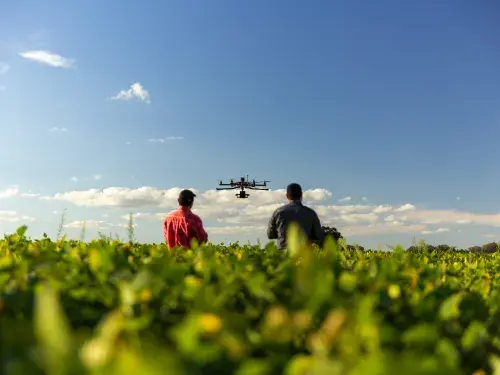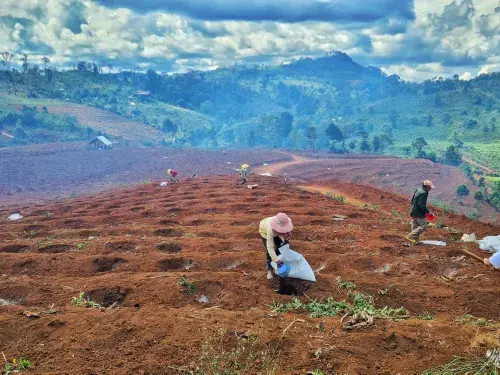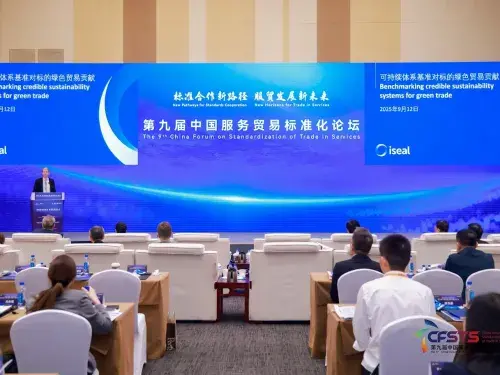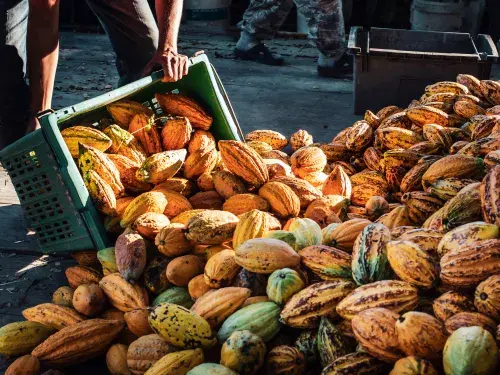Scaling impact in a changing environment: learnings from the ISEAL Innovations Fund
Sustainability systems are working in increasingly complex conditions. Expectations around data, reporting, and equitable consultation with workers and communities are rising.
Lessons from a large-scale sustainable agriculture programme in South India
In this overview, Laura Monikowska summarises key insights from a recent Evidensia blog by Dr Iris Berger and Dr Oscar Morton, which examines new evidence from South India’s Zero Budget Natural Farming programme, showing that agroecology can increase farmer profits, maintain crop yields, and support biodiversity at scale. These findings...
A pathway to prosperity: Why landscape and jurisdictional approaches matter for smallholders
Across Asia, landscape and jurisdictional approaches (LJAs) are gaining traction beyond deforestation, and are now increasingly recognised for their role in supporting smallholder inclusion and improving livelihoods. In turn, these approaches are helping to address income insecurity – often a root cause driving unsustainable land use.
SBTi joins as an ISEAL Community Member
We are pleased to announce that the Science Based Targets Initiative (SBTi) has been approved as an ISEAL Community Member. Their knowledge of voluntary science-based targets for companies will bring valuable insights to our growing community.
Reflections on COP30: credible sustainability systems are driving climate action at scale
On the international stage, the COP30 climate summit in Belém, Brazil, achieved mixed results. The final agreement emphasised equity and a ‘just transition’ but failed to increase commitments to phasing out fossil fuels. Even with the backdrop of the Amazon rainforest, negotiators left without a plan to end deforestation. Nevertheless, I left...
Building resilient, inclusive supply chains with sustainability systems: insights from palm oil, cocoa and soy
As expectations for deforestation- and conversion-free (DCF) supply chains rise, companies face increasing pressure to demonstrate legal, deforestation-free, and responsible sourcing. Evolving regulations, such as the EU Deforestation Regulation (EUDR), require stronger due diligence and better data – but also create opportunities to build more resilient and inclusive supply chains.
How the smart mix can deliver sustainability at scale
One of the biggest challenges facing sustainability leaders today is scaling action. How do we shift from a few companies doing the right thing to transforming entire supply chains and sectors? And what does that look like in practice? These were the questions at the heart of ISEAL’s Sustainability Policy...
Building confidence in sustainability data: How ISEAL members are strengthening data reliability through the Data Maturity Rubric
From data silos to shared insight – ISEAL members are raising the bar for high-quality, transparent and interoperable data, ensuring that sustainability data is trusted, comparable, and used with confidence.
Beyond certified supply chains: ISEAL Innovations Fund call for EOIs
Global market systems depend largely on small-scale producers, who face mounting climate and environmental pressures. Around 80% of small-scale producers operate outside certified markets, selling into local, regional or global markets. As new regulations demand greater supply chain accountability, businesses must strengthen their social and environmental performance while addressing the...
From field to map: Supporting sustainability systems with new geospatial resources
Geolocation data underpins the ability of sustainability systems and their partners to track activities, assess environmental risks, and measure impact. ISEAL has updated its guidance on mapping certified activities and commissioned new research on how spatial datasets can be used to monitor change and impact. By collecting and analysing spatial...
Choosing the right chain of custody model for supply chain impact
For companies with complex supply chains, meeting deforestation-free commitments and regulations requires a balance of traceability and efficiency. ISEAL’s new guidance can help companies choose the right chain of custody approach.
ISEAL publishes 2024 Annual Review
With the release of ISEAL's Annual Review 2024, we reflect on a year of innovation and progress in advancing credible sustainability practices.
Meeting the EUDR legality requirement: Human rights and the role of voluntary sustainability systems
ISEAL is helping voluntary sustainability systems support companies in meeting the EU Deforestation Regulation’s legality requirement, which includes compliance with human rights laws. Verifying legal production against human rights laws is challenging, especially in areas like labour conditions and free, prior and informed consent (FPIC). Sustainability systems can support corporate...
Chinese version of ISEAL Benchmarking Guide released at high-level trade forum in Beijing
The China Council for Promotion of International Trade Commercial Sub-Council (CCPIT-CSC) and ISEAL have strengthened their collaboration with the launch the Chinese version of the Good Practice Guide for Benchmarking Sustainability Systems v. 2《可持续体系基准对标良好实践指南(第二版)》 (the benchmarking guide). The release took place at the 9th Annual China Forum on Standardization of...
New case study | Navigating EUDR: compliance and beyond – Cocoa
This is the second in our series on deforestation-risk commodities, exploring how credible voluntary sustainability standards (VSS) can support businesses navigating evolving market requirements while advancing broader sustainability goals and smallholder inclusion in supply chains.
How credible sustainability systems strengthen climate commitments
The urgency of credible climate action meets a rapidly shifting global landscape. Geopolitical shifts are reshaping supply chains and investment, while new reporting rules raise the bar for transparency. From the Greenhouse Gas Protocol to ISO and the Science Based Target initiative, accounting and reporting standards are evolving to meet...
New ISEAL brief highlights innovative pathways for climate action
How can sustainability systems help to accelerate climate action? An upcoming learning brief from the ISEAL Innovations Fund offers answers, drawing on projects that test new approaches to emissions reporting, just transitions, and smallholder engagement across complex value chains.
ISEAL releases updated version of the ISEAL Code
ISEAL has published version 1.1 of the revised ISEAL Code of Good Practice for Sustainability Systems (the ISEAL Code), introducing editorial updates and clarifications based on stakeholder feedback.

















